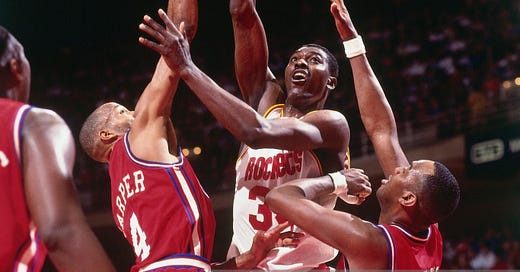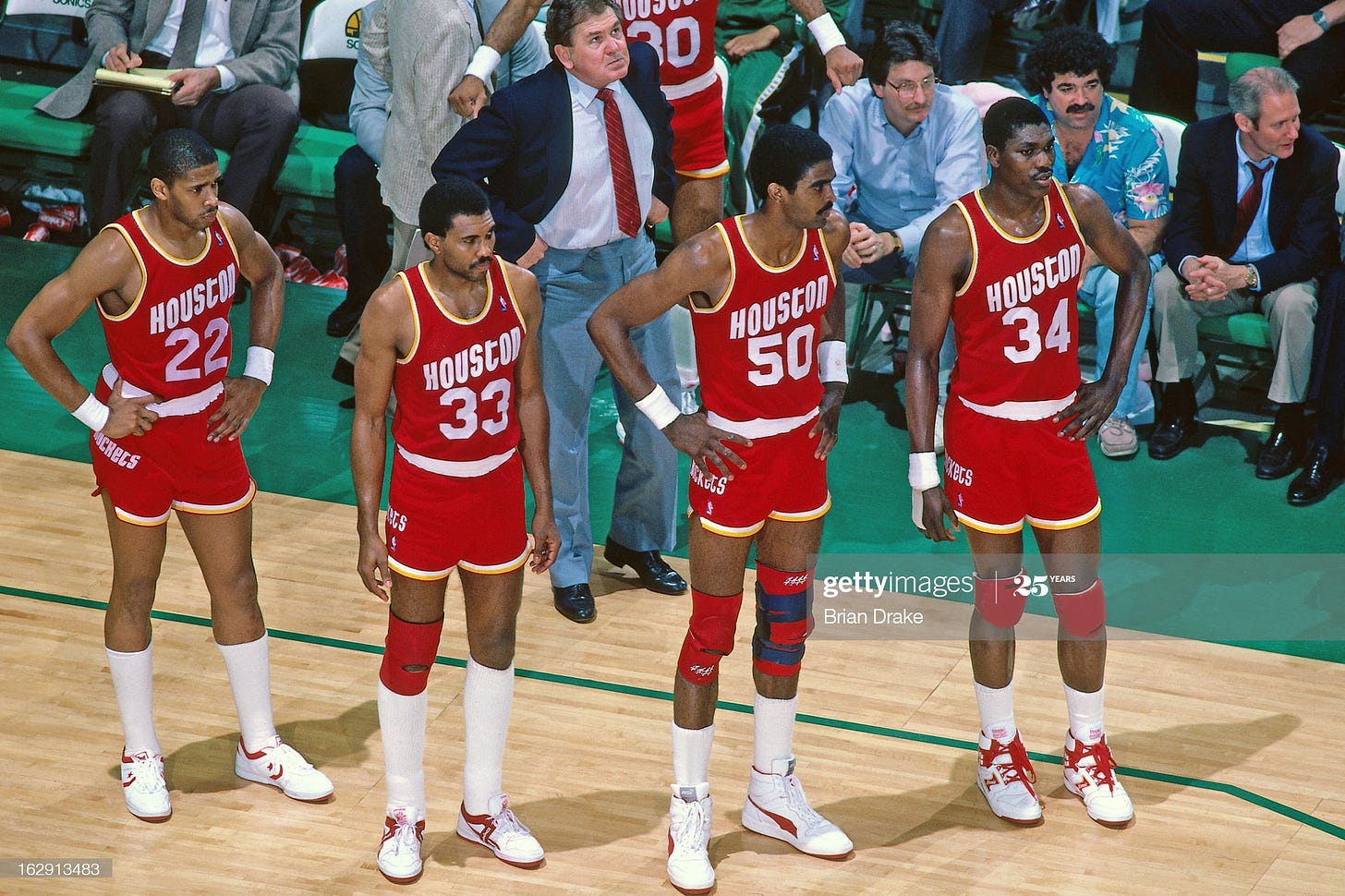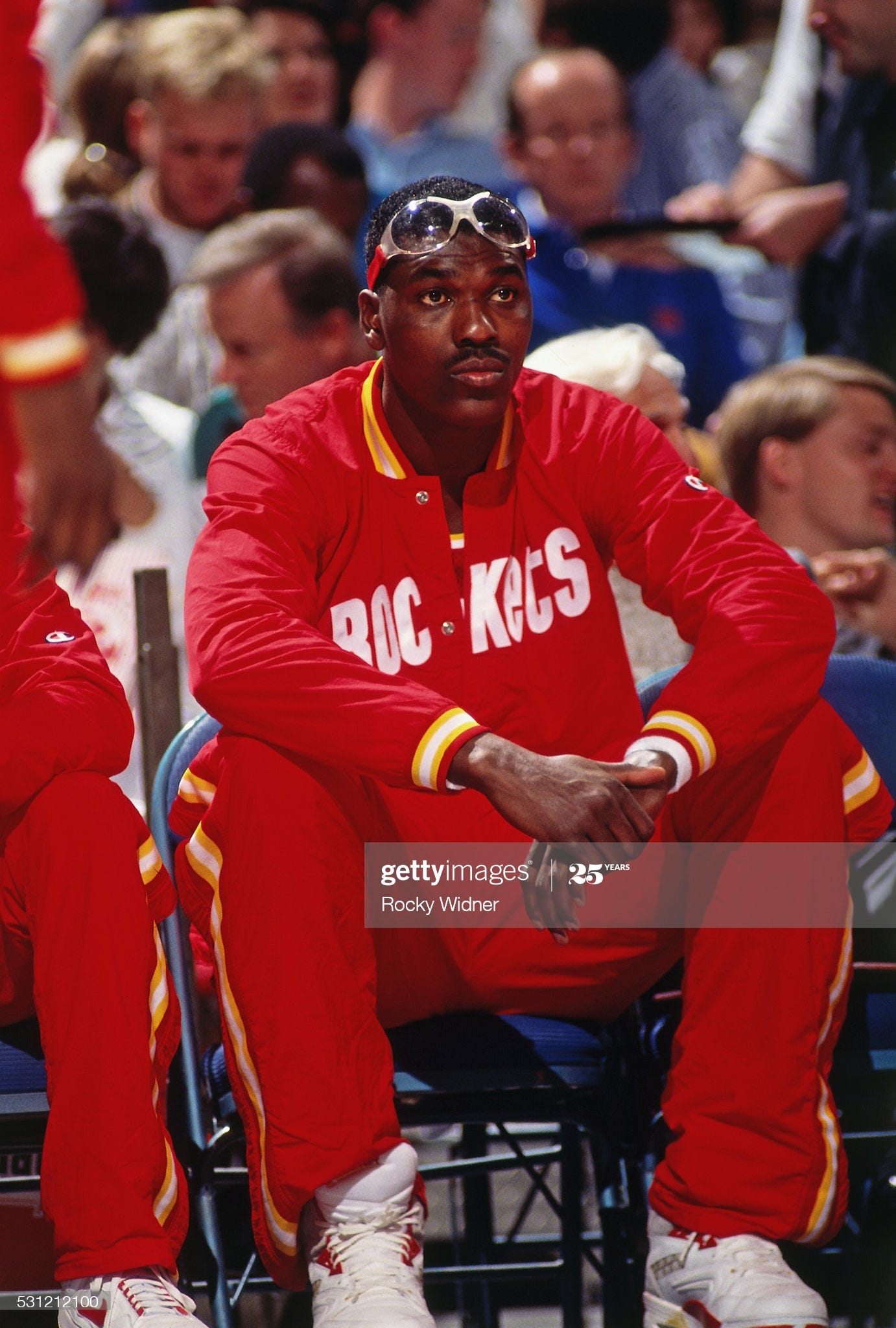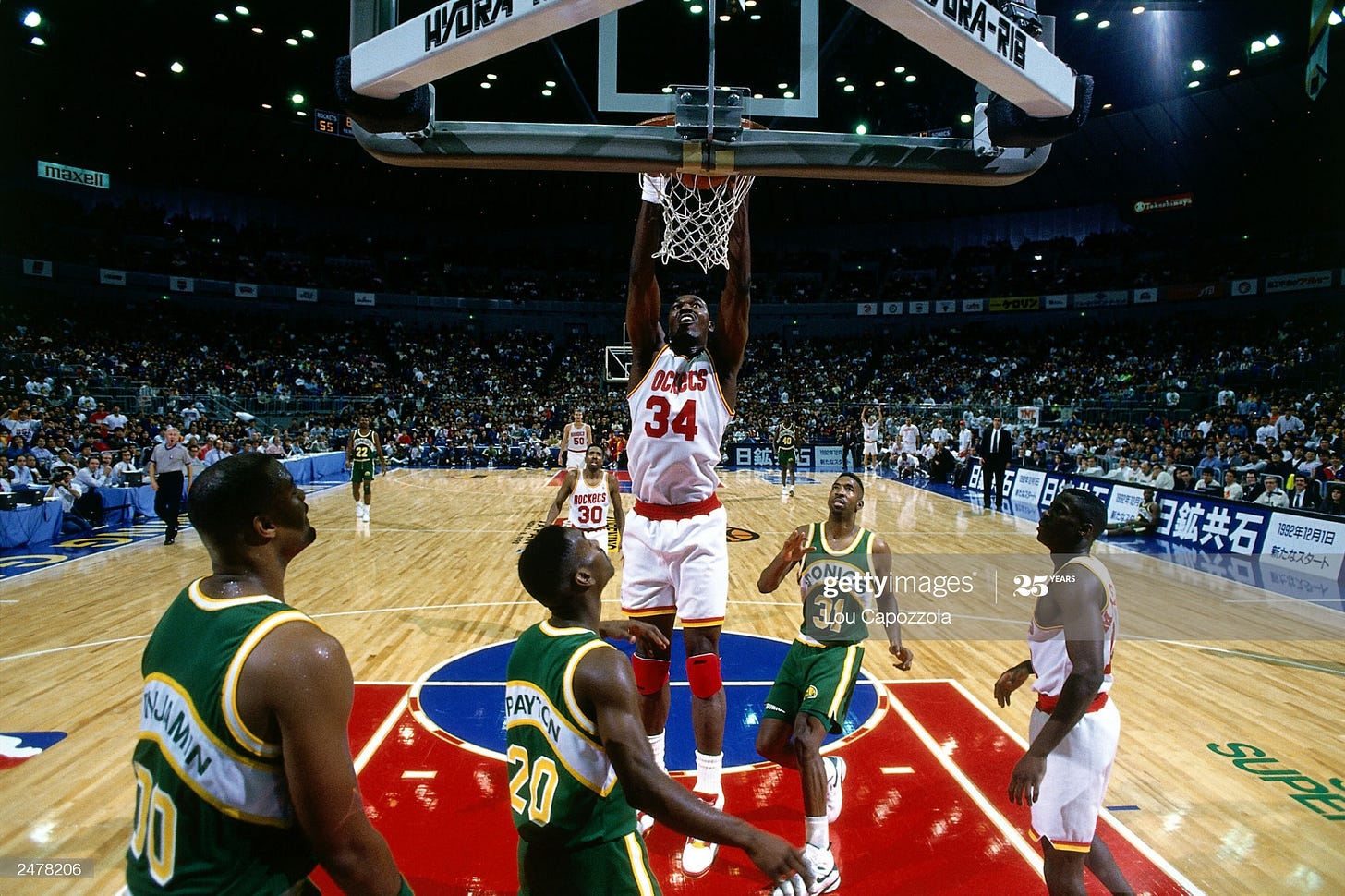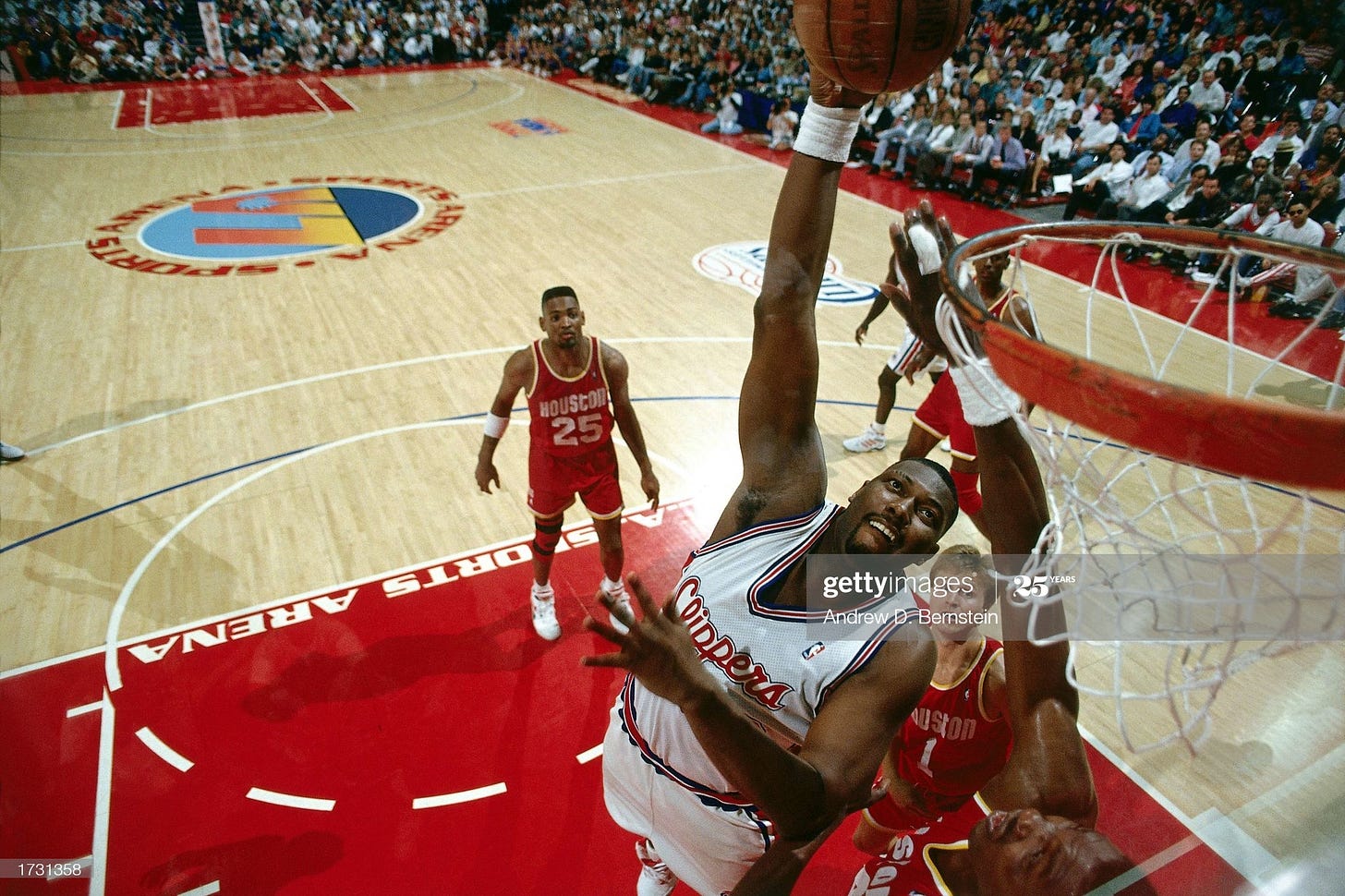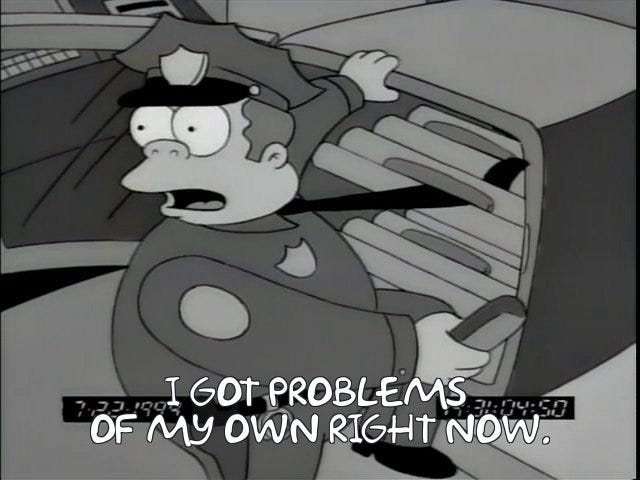Almost Upset: Clippers-Rockets 1993
Just a year after they nearly upset the Utah Jazz, the Los Angeles Clippers are back and ready to pull another Almost Upset.
The Houston Rockets narrowly escaped eternal embarrassment thanks to the Herculean efforts of Hakeem Olajuwon. The Rockets depending on Hercules Hakeem had been the franchise’s M.O. for a few years at this point.
DREAM ON
Entering the 1986-87 season, the Houston Rockets were defending Western Conference champions. They had won 51 games the previous year and taken the highly-vaunted 1986 Boston Celtics to six games in the Finals—despite not having their starting point guard John Lucas. That Celtics team is one of the greatest to step on the hardwood. They won 67 games in the regular season and only three of their 15 losses came by double-digits. Their largest defeat was by 18 points.
The upstart Rockets taking two games from Boston in the Finals was notable because Boston lost just one other game in the entire playoffs. Houston also pasted Boston by 15 points in Game 5. Houston deservedly lost the series, but there was rightful hope that this team behind two youthful big men (Olajuwon and Ralph Sampson) could contend for years and years. Especially if they actually got a real point guard to replace Lucas.
Well, their Finals follow-up campaign concluded with a mundane 42-40 record in 1986-87. But Sampson had missed half the year with injury. So the record was not optimal, but defensible. And in the first round, Houston handily upset the 49-win Portland Trail Blazers proving perhaps that they could be one of those teams that malaise during the regular season, but “turn it on” in the playoffs.
Olajuwon certainly seemed to have turned it on. He averaged 27.3 PPG, 9.3 RPG, 5.0 BPG, 4.3 APG, and 2.5 SPG against Portland.
(Prepare yourself for more outrageous stat lines from Hakeem in this here article.)
In the ‘87 semi-finals, Houston met up with the 39-win Seattle SuperSonics, who pulled off an upset of their own versus Dallas. The Rockets stunningly lost the series in six games despite Olajuwon averaging 30.5 PPG, 12.7 RPG, and 3.8 BPG. In the double-overtime series finale, Hakeem had 49 points, 25 rebounds, and six blocks.
Sampson had 19 points, but shot a horrid 7-22 FGs. Food for roster-decision-making-thought.
Meanwhile in the “backcourt,” forwards Robert Reid and Rodney McCray were still masquerading as point guards. They were both really good players and fine playmakers as forwards. But placing so much playmaking duty on them, in lieu of having a real point guard, was a stretch that broke the Rockets. More food for roster-decision-making-thought.
Thoughts digested… and…
Early in the 1987-88 season, Houston gave up on the Twin Towers trading Sampson to Golden State for point guard Sleepy Floyd (and the moribund Joe Barry Carroll). The Rockets won 46 games, but lost in the first round to the Dallas Mavericks.
Olajuwon averaged 37.5 PPG, 16.8 RPG, 2.8 BPG, and 2.3 SPG in the series.
The 1988-89 Rockets acquired power forward Otis Thorpe from the Sacramento Kings in exchange for forward-center Jim Peterson and McCray. Houston won 45 games under new coach Don Chaney who replaced Bill Fitch. The Sonics once again eliminated Houston from the playoffs; this time it was 3-1 first round defeat.
Olajuwon averaged 25.3 PPG, 13.0 RPG, 2.8 BPG, and 2.5 SPG in the series.
The 1989-90 season saw Houston go just 41-41. They did pick up shooting guard Vernon Maxwell for pocket change from the San Antonio Spurs. The 8th seeded Rockets were handily dismissed by the Los Angeles Lakers in the first round.
Olajuwon averaged 18.5 PPG, 11.5 RPG, 5.8 BPG, and 2.5 SPG in the series.
The 1990-91 Rockets perked up big time with 52 wins. They acquired Kenny Smith, able to play either guard position, from the Atlanta Hawks essentially for a future first round pick. Nonetheless, Houston was swept out the first round by the Lakers.
Olajuwon averaged 22.0 PPG, 14.7 RPG, 2.7 BPG, and 1.3 SPG in the series.
The 1991-92 Rockets had no major additions and sleptwalked to 42 wins. They missed the playoffs entirely. Chaney was fired as coach 52 games into the year and Rudy Tomjanovich was installed. Chaney went 26-26, Rudy 16-14. Not much difference at least for that season.
TURNING POINT
After a half-decade of flameouts, the 1992-93 Rockets would restore Houston to basketball greatness, but it didn’t look that way initially.
On January 8, 1993, the Rockets lost, 115-90, to the Denver Nuggets. They sat uncomfortably with a 14-16 record. They then proceeded to rip off an eight-game win streak. After a ho-hum 5-5 stretch, the Rockets again went on a tear winning 14 consecutive games. A brief 2-4 relapse was followed by a 10-game win streak.
Add it all together and Houston was 55-27, the best record in franchise history to that point.
Olajuwon finished second in MVP voting as he produced a career-high of 26.1 PPG. He also led the NBA in BPG (4.2) and was voted Defensive Player of the Year for the first time. His FG% was the highest it had been since his rookie season. His FT% was a career-high of .779. And he also hit a new high with 3.5 APG. And another new high of 39.5 MPG as he played in all 82 games.
The Dream was firing on all cylinders.
As we’ve seen, though, Olajuwon had performed amazingly before. The difference was now he had a supporting cast that was growing worthy of his talents.
The steady acquisitions of Thorpe, Maxwell, and Smith were solid over the years. Floyd had been a fine player too, but now he was at the end of his career, so that was a step back. The Rockets did make up some ground by adding rookie forward Robert Horry.
Houston also was drowning opponents in threes.
Since 1991, the Rockets were one of the NBA’s leaders in chucking three-pointers. Adding Maxwell and Smith will do that. But over time the team got much better at making them. And the threes became a greater and greater share of their shot attempts. In the chart below, “3Pr” measures three-pointers as a percentage share of all team field goal attempts.
Houston was leading the league in 3Pr while simultaneously increasing the total volume and accuracy.
Now we can largely thank Maxwell and Smith for the volume, but not necessarily the accuracy. Smith was steady, while Vernon was a streaky shooter. If Mad Max gets on a roll, look out. But he could also have long droughts. Houston helped buttress its three-point shooting by adding big men who could also do the job, namely Matt Bullard and now Horry, who would grow into the role better the following year.
Here are some tables showing Houston’s growing distribution of threes on the roster. Only players with 40+ attempts a season are shown.
It also didn’t hurt that Olajuwon was getting better and better at passing out of double teams to open up three-point shooters.
So with all this growth and change in attitude and style, surely the Rockets would coast in the first round? Well, obviously not cuz they’re here in Almost Upset. The best regular season in franchise history nearly went down the tubes thanks to the grimy Los Angeles Clippers.
After all these changes and roster improvements, Houston still had to fall back on Hercules Hakeem to save the day in one of his greatest playoff performances.
OFFICIAL PROHOOPSHISTORY STARTING LINEUP SCOREBOARD
(the deeper the shade, the bigger the presumable advantage)
You might notice this fella named “Winston Garland.” He was a starter in this series only because Vernon Maxwell was coming off a wrist injury, Maxwell appeared in the final two games as he got his legs (hands?) back underneath him. Maxwell’s absence and then re-integration definitely hurt the Rockets in this series.
With Houston’s troubles, the Clippers could be expected (not assured) to win the guard matchup every night, while the forward battle could go either way.
Thank goodness the Rockets had Hakeem Olajuwon in the middle to abuse Stanley Roberts.
PREDICTION: Rockets sweep!
GAME 1: ROCKETS 117 — CLIPPERS 94
28 points, 11 rebounds, nine blocks, six assists, four steals, and 12-20 FGs.
Yep, thank goodness the Rockets had Hakeem to spearhead this unmitigated ass-whoopin’. Houston raced out to a 33-18 first quarter lead and didn’t look back the rest of the night.
As a team, they shot .627 from the field and 6-10 from downtown as the Clippers proved hapless, absolutely hapless. Up and down Houston’s lineup were fantastic, steamrolling performances.
Onward to the next game, where I’m sure the Clippers will just roll over.
GAME 2: CLIPPERS 95 — ROCKETS 83
30 points, 14 rebounds, four blocks, four assists, two steals, and 18-20 FTs.
Hakeem was great again, except the field goals. A horrible 6-19, which equates to a .316 percentage. The Rockets as a team shot .315 from the field overall and just 4-16 from three-point range, so the Clips did something right.
The Rockets backcourt went from surprisingly great in Game 1 to absolutely atrocious.
Smith/Garland in Game 1: 31 points, 15 assists, and 12-18 FGs.
Smith/Garland in Game 2: 18 points, 4 assists, and 5-23 FGs.
The Clippers backcourt meanwhile had their own reversal of fortune.
Jackson/Harper in Game 1: 28 points, 8 assists, and 10-25 FGs.
Jackson/Harper in Game 2: 42 points, 11 assists, and 16-32 FGs.
The main turnaround for LA’s guards was Ron Harper. Despite twisting his knee in Game 1, Harper scored 12 of his 29 points in the third quarter. “I came in here with pride,” Harper said afterwards. Admitting his knee was “kind of sore,” Ron accurately concluded, “I did my job and we played good defense.”
Furthermore, Stanley Roberts had an admirable game. It didn’t measure up to Olajuwon’s, but it helped reduce the damage as he produced 17 points on 7-9 FGs. Roberts and John “Hot Plate” Williams also spearheaded an aggressive (some might say harassing) overplay on Olajuwon. Both players fouled out, but the defense ground Houston’s offensive flow to a halt—as we saw above from those awful shooting numbers.
The game was seized by the Clips in the third when Harper sparked an 18-6 run. The victory snapped a 15-game Clippers losing streak in Houston and was the first time they had beaten the Rockets all season.
GAME 3: ROCKETS 111 — CLIPPERS 99
32 points, 12 rebounds, four blocks, two assists, and 14-20 FGs.
Hakeem took no breaks, man. Also, Houston’s backcourt got back on track: 27 points, 12 assists, and 10-19 FGs for Smith and Garland. And Thorpe pummeled the interior along with Hakeem as O.T. had 22 points and nine rebounds on 8-11 FGs and a perfect 6-6 from the line.
After going up 16-8 in the first seven minutes, Houston never looked back in this one as Los Angeles never got closer than six points the rest of the way.
For the Clippers, Roberts was a non-factor. Zero points in 18 minutes before fouling out. Ken Norman was also bad. Eight points, on 4-15 shooting.
Jackson and Harper again terrorized Houston. 40 points, 15 assists, and 16-24 FGs. Houston got this win, but you can’t keep letting those two run wild.
Oh, and Danny Manning decided to show up. 23 points after just 25 points total in the first two games.
Alarmingly, Houston’s three-point shooting was subpar for a second straight game: 4-14 shooting from long range.
Whatever. Wins a win. Time to close this series out!
GAME 4: CLIPPERS 93 — ROCKETS 90
25 points, 18 rebounds, nine assists, five blocks, and 10-23 FGs.
Olajuwon showed up, but the rest of the Rockets were doing some sleep walking. Except Bullard. He shot 3-3 from three-point range, so he gets a pass.
Horry was 2-6 for just four points. Thorpe was fine with 14 points and eight rebounds, but Hakeem needs some damn help, not merely fine. Maxwell returned from injury playing just six forgettable minutes. Garland kept the starting spot and had 12 points on 6-13 FGs… and six turnovers.
Nonetheless, Houston still had a chance to win because of Hakeem… and this was an ugly ass game there for the taking.
The Clippers shot 36-92 from the field (.391) and 17-29 from the line (.586). And their victory was a testament to ball control. Just six turnovers the whole night for the entire team. And Roberts was in fine form with 20 points and 13 rebounds. Harper was splendid too with 21 points.
As you might gather, the rest of the Clips struggled offensively. Norman was an alright 5-12. Manning a horrific 5-19. Jackson a truly tragic 2-13.
But Jackson made three free throws in the final 33 seconds of the game to secure the win.
In a preview of his widely praised broadcasting career, Jackson afterwards assured everyone that “There was no pressure.” He continued, “I believe I can fail, but I do not believe in failure.”
Uh huh.
Well, anyways, on to the do-or-die Game 5…
GAME 5: ROCKETS 84 — CLIPPERS 80
31 points, 21 rebounds, seven blocks, three steals, three assists, and 14-27 FGs.
Give Hakeem all the money he could ever want, because this performance was legendary as everything else on the court turned into a morass of incompetence.
Houston shot .384 from the field. Los Angeles .387.
23 turnovers for the Rockets. 17 for the Clippers.
Winston Garland went 0-5 from the field in 16 minutes. Rudy T saw enough of Garland and let Maxwell shoot to his heart’s content, which amounted to a miserable 4-15 overall and 2-8 from three-point range for Mad Max. Robert Horry was 0-5. Scott Brooks 0-3.
Even the helpful Rockets players gave a shovel full of shit for every pound of sugar. Kenny Smith had 19 points and six assists on 8-15 FGs. He also committed seven turnovers. Otis Thorpe had 12 points and 17 rebounds. He shot just 5-13 from the field and also turned it over three times.
Matt Bullard went 2-2 from downtown…. and had two turnovers in 11 minutes. Dude’s only job is to catch and shoot. You shouldn’t have two turnovers in 11 minutes!
Fortunately for Houston, the Clippers were having their own problems.
Jackson had eight points, nine assists, and seven rebounds… but shot 4-13. Danny Manning had 24 points and 12 rebounds… but six turnovers. Their bench shot 4-15. The only unmitigated bright spot was Ron Harper scoring 19 points with six steals.
Nonetheless, the Clippers nearly won this damn game.
Down 79-70, the Clippers went on a 10-0 run. A Harper lay up concluded the streak which left LA up 80-79 with about 1:20 remaining in the game. Talk about an epic collapse from the Rockets.
Anyways, remember earlier how I said Maxwell was a streaky shooter?
He missed his first seven shots of the game, but made a three-pointer with 56 seconds left to put Houston up, 82-80. With no Winston Garland in sight, Kenny Smith got the final points of the night: a breakaway dunk with about 30 seconds remaining to give Houston its 84-80 win.
You can watch the game if you want. But be warned, outside of Hakeem’s brilliance, there’s a whole lot of slop. Dramatic slop, though.
AN END, A BEGINNING
After two credible seasons that saw them nearly topple two 55-win teams in the first round, the Clippers went back to clipping for the 1993-94 season. They finished 27-55 as Larry Brown ditched the club for the Indiana Pacers. Danny Manning was traded midseason for Dominique Wilkins. And somehow they found playing time for 1980s relic Mark Aguirre.
On the bright side, this was also Bo Outlaw’s rookie season. And everyone loves Bo!
The Clippers would not make the playoffs again until the 1996-97 season, with a 36-46 record under Bill Fitch in his last NBA coaching gig. They wouldn’t have another winning season until 2005-06.
As for the Houston Rockets, they were ousted in the 1993 semi-finals by the Sonics in seven games. In overtime.
Olajuwon averaged 23.1 PPG, 13.1 RPG, 4.7 APG, 4.3 BPG, and 1.7 SPG against Seattle. This after averaging 29.2 PPG, 15.2 RPG, 4.8 APG, 5.8 BPG, and 1.8 SPG against the Clippers. He led Houston in all those categories for that postseason.
These monstrous Olajuwon playoff runs, which were routine, needed better teammates so “the run” could actually have some longevity.
You know, a marathon run instead of a sprint.
In 1993, Houston’s starting lineup of Olajuwon, Maxwell, Smith, Horry, and Thorpe plus a bench of Bullard, Garland, Scott Brooks, and Carl Herrera was still a work in progress on this front.
Essentially 5K material. The support was getting better, but not yet ready for the full marathon.
For the 1993-94 season, Houston added rookie guard Sam Cassell and journeyman Mario Elie. The two would give the Rockets yet more three-point shooting and, importantly, unflinching mettle in the clutch.
Now we got a marathon club ready for some classic series, which I’m sure most of you are at least passingly familiar with, that culminated in two championships.
We’ll see the Rockets again in Almost Upset, but they’ll be trying to reclaim their championship glory with a much different, geriatric roster.
In the meantime, we have another series from the 1992-93 season that would have been even more embarrassing than the Rockets losing to the Clippers.
It’s the 39-win Los Angeles Lakers nearly sweeping the 62-win Phoenix Suns.
